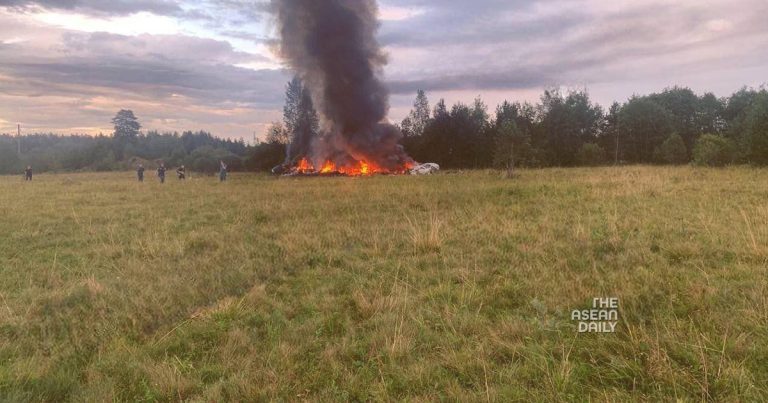6-10-2023 (MOSCOW) Russian President Vladimir Putin made a startling revelation on Thursday, suggesting that the tragic plane crash in August, which claimed the life of Wagner mercenary chief Yevgeny Prigozhin, was not the result of a missile attack, as previously speculated, but rather the detonation of hand grenades inside the aircraft.
The ill-fated private Embraer jet carrying Prigozhin and nine others crashed to the north of Moscow on August 23. The victims included two other high-ranking figures within the Wagner organization, Prigozhin’s four bodyguards, and a three-person crew.
Putin conveyed his belief that the plane’s demise resulted from an internal explosion, pointing to information he had received from the head of Russia’s investigative committee just a few days prior.
“Fragments of hand grenades were found in the bodies of those killed in the crash,” Putin disclosed during a meeting at the Valdai Discussion Club in the Black Sea resort of Sochi. “There was no external impact on the plane – this is already an established fact,” he added, seemingly refuting assertions made by unidentified U.S. officials shortly after the incident, who had claimed it was a missile strike.
Despite his revelation, Putin did not delve into further details regarding how these hand grenades could have been detonated on board. However, he expressed his skepticism about the investigators’ failure to conduct alcohol and drug tests on the crash victims.
“In my opinion, such an examination should have been carried out but it was not,” Putin remarked. He also shared that during searches of Wagner’s offices in St. Petersburg, the FSB security service had discovered 10 billion roubles ($100 million) in cash and 5 kg (11 pounds) of cocaine.
To date, the investigators examining the plane crash have not made their findings public. Neither the Wagner group nor Prigozhin’s family could be reached for comment on Putin’s statements.
WAGNER’S UNCERTAIN FUTURE
Yevgeny Prigozhin’s demise came two months after leading a brief mutiny against Russia’s defence establishment, a challenge to Putin’s leadership that was unprecedented since he assumed power in 1999. Western diplomats contended that the mutiny exposed the strains Russia faced in connection with the ongoing war in Ukraine.
The Kremlin vehemently denied any involvement in Prigozhin’s death, dismissing the suggestion as an “absolute lie.”
The fate of the Wagner group has been in flux since Prigozhin’s mutiny and subsequent death, during which Putin ordered Wagner fighters to sign contracts with the defence ministry, a move Prigozhin and many of his men had opposed.
When questioned about the future of private military companies in Russia, Putin noted that no specific laws governed such entities, resulting in a “clumsy” experience with them in the country. He stated, “We do not yet have a consensus in Russia about whether we need such formations or not, but today I can say for sure that several thousand fighters of this company have already signed contracts with the armed forces.” He clarified that they could participate in conflicts on the basis of individually signed contracts, a departure from the previous arrangement.
Prior to his untimely death, Prigozhin had portrayed Wagner, once a formidable force with tens of thousands of members, as the world’s most battle-hardened fighting unit. He had accused the top military leadership, including Defence Minister Sergei Shoigu and General Staff Valery Gerasimov, of incompetence and had cautioned that Russia risked losing the war in Ukraine unless it improved its performance.
Putin remained somewhat ambivalent regarding the future of private military companies in Russia and their legal status, stating, “This is a complicated process, we are discussing and thinking about it. In many countries, such companies exist, are actively working and, above all, they work abroad, we all know this well. Whether we need them or not, we will think about it.”




